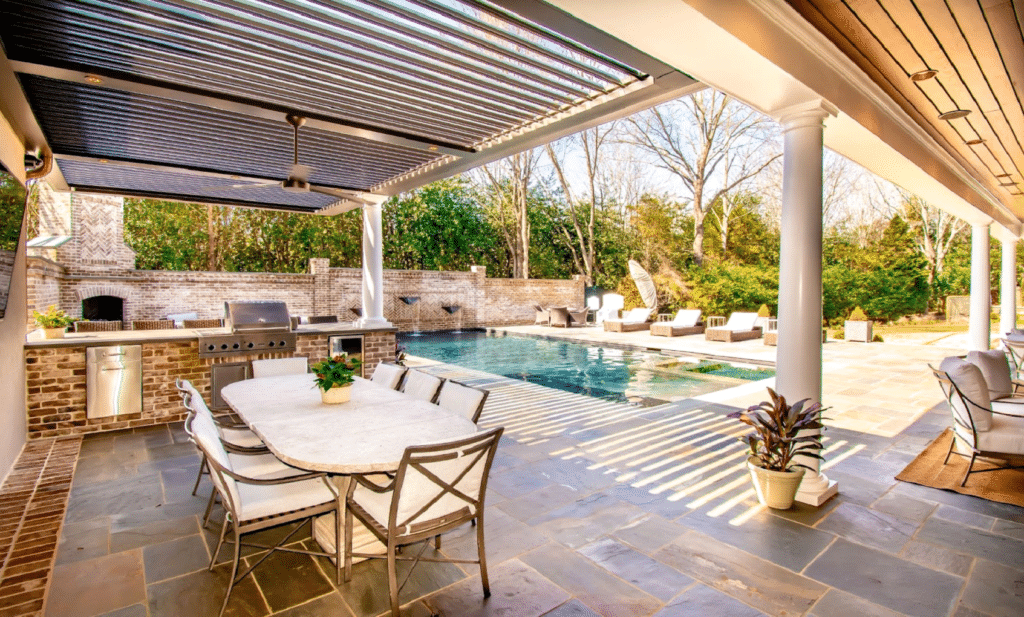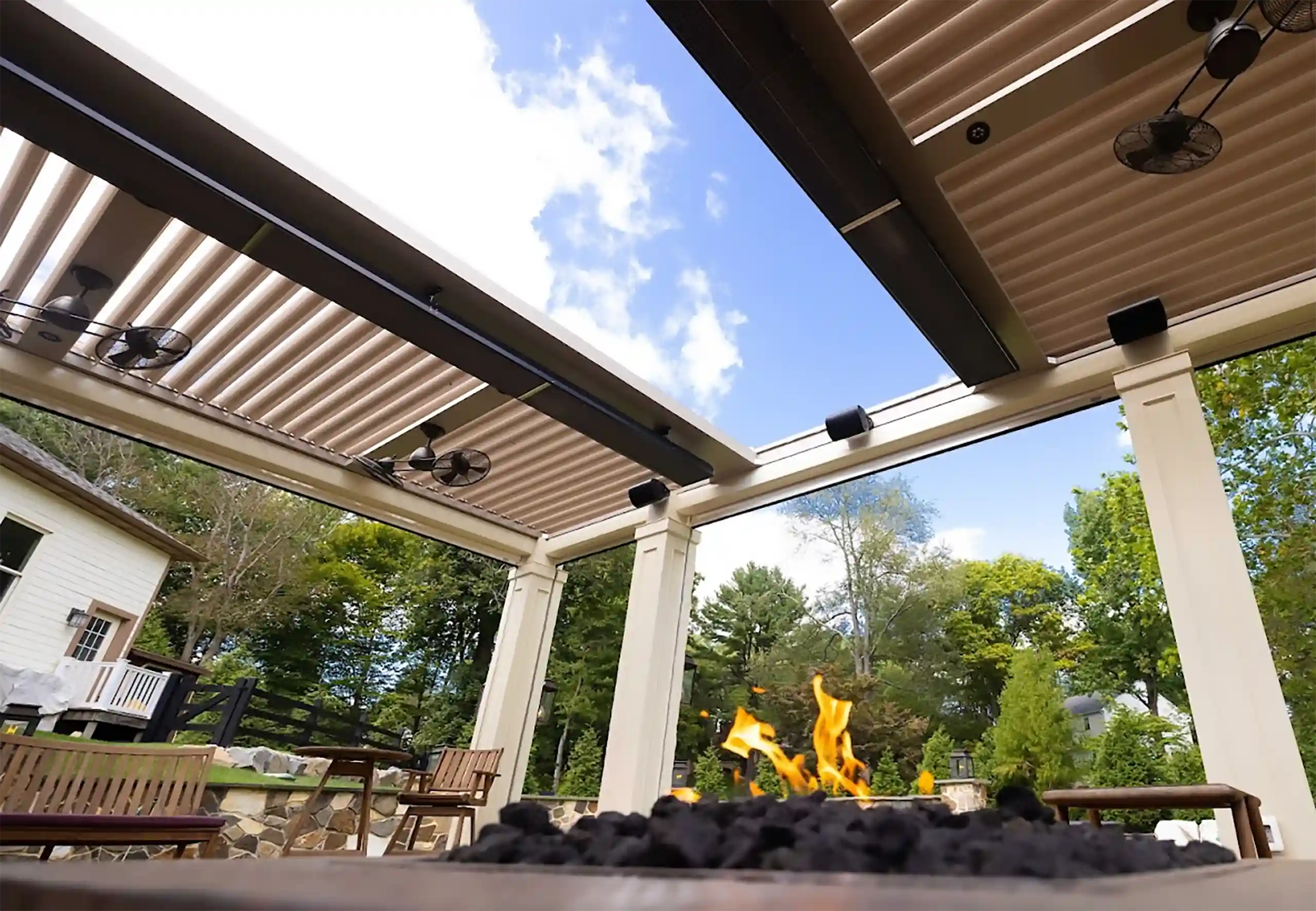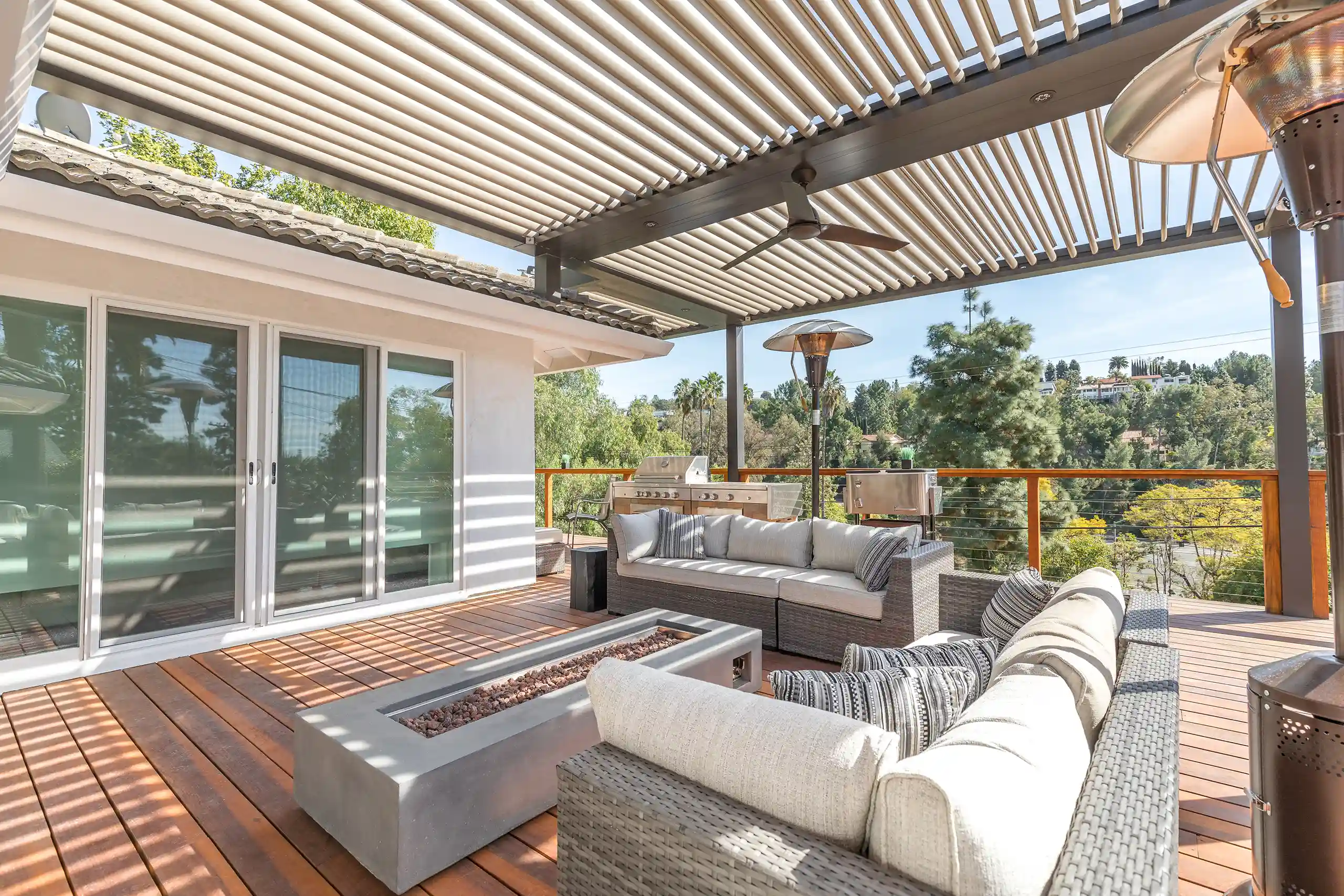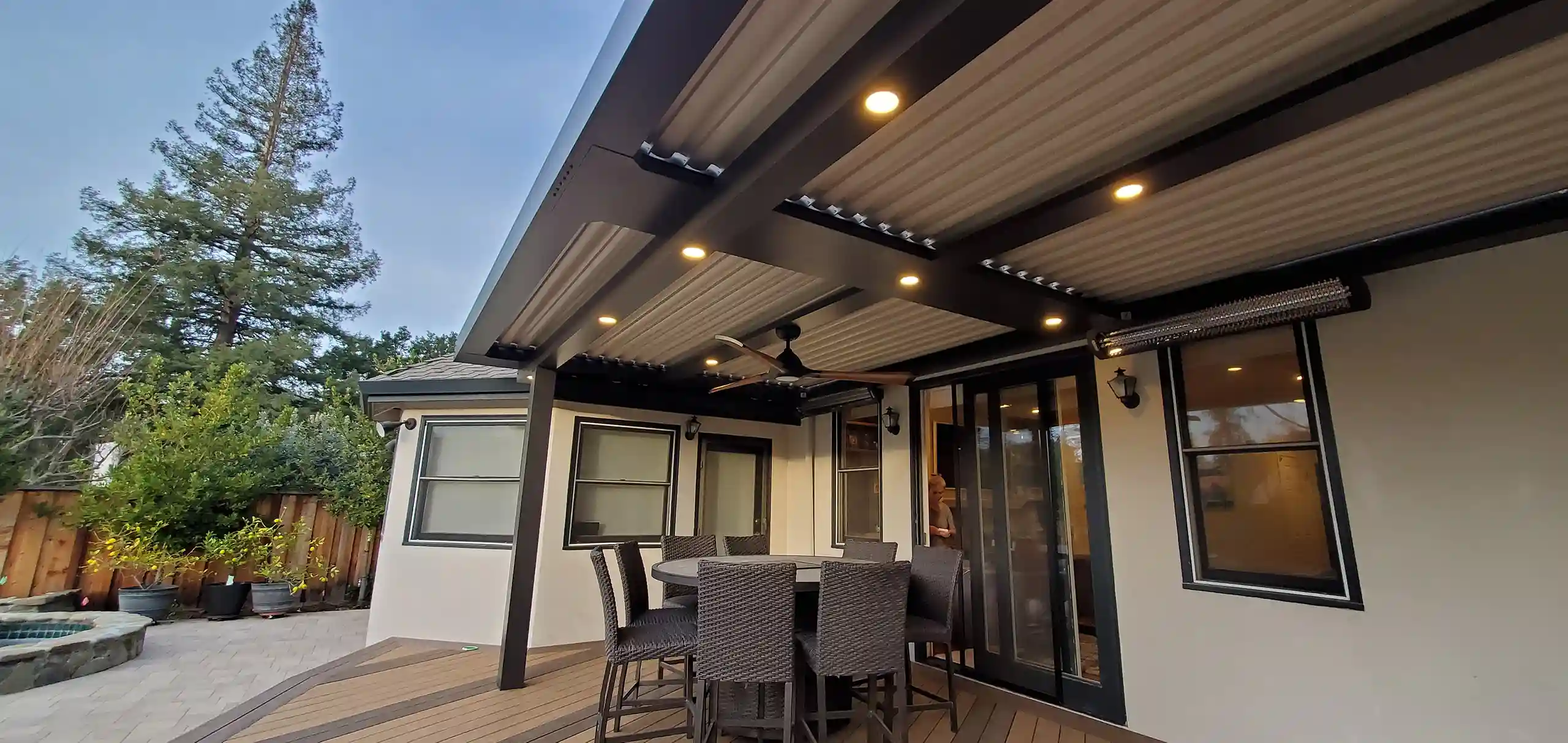What is the best material for a pergola? The three most popular materials for pergolas are aluminum, vinyl, and wood. Ultimately, the answer depends on what you are looking for in terms of durability, cost-effectiveness, maintenance needs, and aesthetic appeal. This article will compare the most popular pergola material options side by side so you can make an informed decision on your next purchase.
Types Of Pergolas We Will Be Comparing:
- Wood pergolas.
- Vinyl pergolas.
- Aluminum pergolas.
- Motorized aluminum pergolas. (Pergolas with motorized louvers that open and close.)
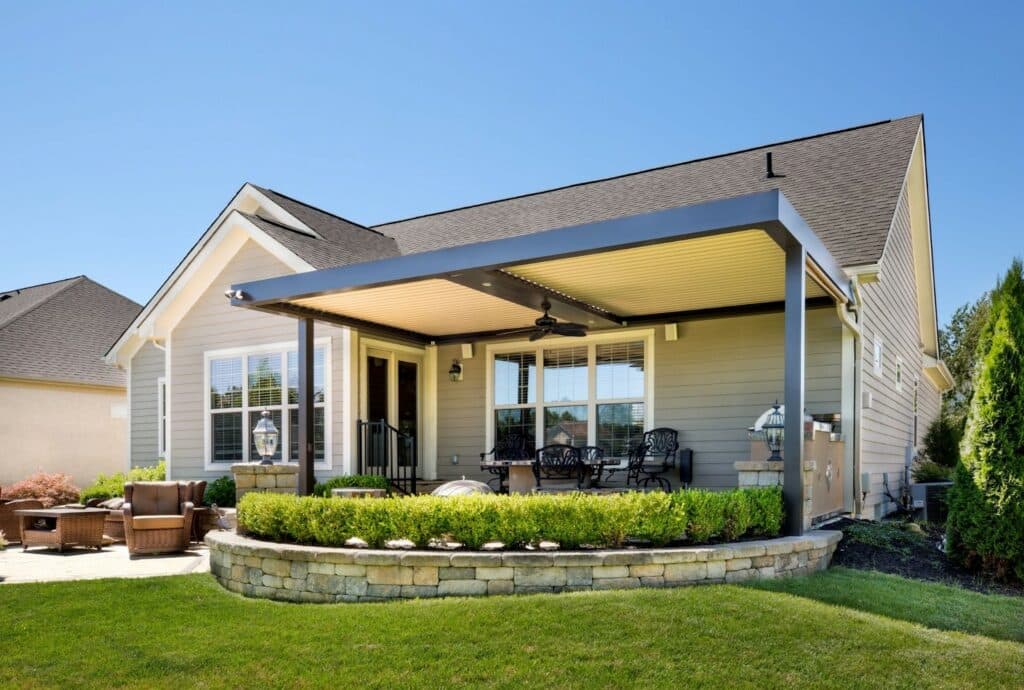
Maintenance And Upkeep
Pergolas are beautiful outdoor structures that provide shade, protection from the elements, and an intimate place to gather with friends or family. The whole point of having a pergola is to make your outdoor living space more enjoyable – but it can quickly become a chore depending on the material you choose.
Wood pergolas: Wood is a classic pergola material that can offer a rustic vibe to your outdoor setting. However, wood requires regular maintenance, such as staining or painting, to keep it looking its best. Wood also has a shorter lifespan than other materials, so you will have to repair and replace it sooner. So be prepared to deal with a lot of upkeep if you choose wood.
Vinyl pergolas: Vinyl is a very low-maintenance pergola material. This plastic-like material is insect and weather-resistant. Vinyl won’t need repainting, staining, sanding, or sealing. Repairs are infrequent, so all you need to worry about is the occasional cleaning.
Aluminum pergolas: Aluminum is an excellent option for those who want a virtually maintenance-free pergola. Aluminum is strong, durable, and won’t corrode or rust when exposed to the elements. You won’t need to worry about staining or painting; the only maintenance is occasionally cleaning it with a hose and a soft-bristled brush.
Motorized Aluminum Pergolas: Aluminum’s strength makes it ideal for constructing modern pergolas that open and close. That’s why most smart pergolas are built with aluminum. For example, the Pergola X is a motorized aluminum pergola that provides complete protection from rain. It keeps your outdoor living space dry and clean, reducing the time you need to spend on maintenance.
Durability - How Long Do Pergolas Last?
So, how long do pergolas last? If you want a long-term investment rather than a quick fix, you must consider the durability of your chosen material.
Wood Pergolas: A wooden pergola will last only 5-10 years, depending on the care it receives. Considering that the maintenance is high and the lifespan is low, it’s impossible to call a wooden pergola a “long-term investment.”
Vinyl Pergolas: Vinyl can last up to 15-25 years with minimal maintenance. Compared to wood, vinyl pergolas will save you time and money in the long run. However, vinyl is sensitive to temperature changes. Constant exposure to sunlight and temperature shifts eventually cause it to become brittle, crack, and fade over time. Moreover, vinyl is structurally not as robust as aluminum, so strong winds, heavy snow loads, and harsh weather conditions can cause it to warp, sag, or deform. Although not a problem initially, this can start to show after years of constant exposure.
Aluminum Pergolas (motorized and non-motorized): Aluminum is a popular choice for outdoor structures because of its strength and durability. It is by far the most robust and long-lasting material for a pergola. Unlike vinyl, aluminum won’t crack, fade, or become brittle. Aluminum pergolas require virtually no maintenance and can last a lifetime. In fact, many aluminum pergolas come with a lifetime guarantee, a testament to their durability.
Tech & Performance - How Well Does It Integrate With Technology?
Pergola Materials Cost:
Some materials are more expensive, but there are other factors. The size and design of your pergola also affect the cost. Always compare apples to apples – what are you getting for the price?
Wood pergolas: Wood pergolas have been the most affordable option for a long time. Up until the 2020 pandemic, treated lumber was pretty inexpensive. However, with the rise of lumber prices in the last few years, wood pergolas are no longer as cheap as they used to be. Wood is also not a long-term investment and will require regular maintenance and eventually needs to be replaced. The up-front cost of wood is low, but the maintenance costs add up over time.
Vinyl pergolas: Vinyl pergolas are typically more expensive than wood but require less maintenance and last much longer. The up-front cost of vinyl is higher, but you’re getting a longer-lasting product, saving you money in the long run.
Aluminum pergolas: Aluminum pergolas are more expensive than wood and priced similarly to vinyl, but they last practically forever. It’s a worthwhile investment that will last for decades without needing to be replaced. The great thing about aluminum pergolas is that once you get one, you won’t have to worry about it for the rest of your life.
Motorized Aluminum Pergolas: Not all aluminum pergolas are equal. Smart, motorized aluminum pergolas are significantly more expensive because they integrate technology to allow you to control the conditions in your outdoor living space. For example, pivoting louvers that slide, close, and open to let in light, ceiling fans that circulate air, and built-in wifi hotspot capabilities to keep you entertained – all of these features add to the cost. However, they also provide a unique and luxurious outdoor living experience that traditional pergolas can’t match.
Conclusion
